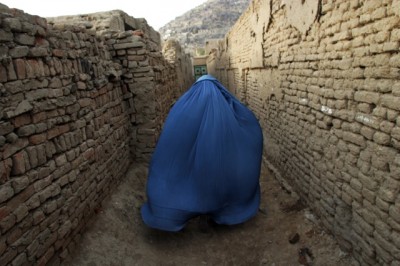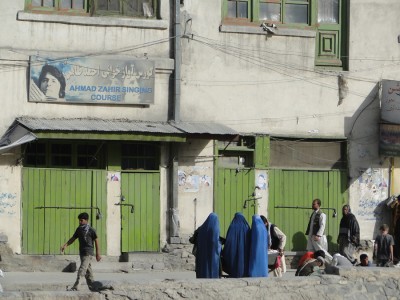Unfiltered Voices: The Afghan Women’s Writing Project
by Elizabeth Hoover / May 17, 2011 / 1 Comment

Afghan woman. Photo: Heidi Levine
Tabasom, whose last name is withheld to protect her identity, writes her poems in secret, then walks four hours through Taliban-controlled territory to access an Internet connection in Kabul so she can share her words with an online writing workshop. Because women are forbidden to travel alone, her brother goes with her. He is the only one who knows what she is doing; if someone else discovers that she is a woman who dares to write and share her words with others, she could be beaten or even killed.
Tabasom is a member of the Afghan Women’s Writing Project (AWWP), a series of online writing workshops run remotely by women writers based in America. In an effort to protect their participants, AWWP doesn’t allow interviews, however, the women describe their experiences in poems, essays, and comments published on AWWP’s website.
“I wish I wrote my destiny/ With silver colors of happiness/ That shined in my life,” Tabasom writes in “Gold Hidden in a River.” The AWWP site not only allows Tabasom and other Afghan women writers to share their work, it also fosters conversations and connections with readers from around the globe. “Please keep writing,” a reader urges in the comment section under “Gold Hidden in a River.” “Your poems will help others, your words release the pain you are in and give a voice for so many women who have no voice or are afraid to use their voice.”
Founder Masha Hamilton sees the comment section of the AWWP magazine as crucial to the program’s success. “Asking an Afghan woman to participate in a writing class is a lot to ask,” she told Sampsonia Way. “We want them to know people are reading their stories.”
These connections can be especially meaningful for women like Tabasom, who lead isolated lives in territories held by the Taliban. Women in these areas are often confined to their homes and forbidden to work, travel, or attend school. Tabasom writes that she would like to work but is afraid to, especially after the Taliban killed her aunt who was working as nurse.
In addition to allowing Afghan writers to connect with each other and with a global readership, AWWP seeks to educate people around the globe about the condition of women in Afghanistan. According to their website, they give readers a chance to encounter the voices of Afghan women, who are usually heard “only through the filter of their men and the media.”
From a Kitchen in Brooklyn
In 1999, Hamilton, a journalist and novelist, saw a haunting video of a woman named Zarmeena executed on a Kabul athletic field. The video ran on the AP wire, but there was almost no information about the woman besides her name. “I realized not only were women being hidden under burqas, but their stories were also hidden,” Hamilton said.
She traveled to Afghanistan in 2004 and 2008 to search out these hidden stories. On her second trip she found that “things were getting worse for women.” In recent years, the Taliban, a fundamentalist Muslim group known for their treatment of women, has steadily regained the territory they lost after the 2001 American invasion. The London-based International Council on Security and Development estimates that currently 80 percent of Afghanistan is under Taliban control. According to UNIFEM, the United Nations Development Fund for Women, 60-80 percent of Afghan women are in forced marriages, often before they reach 16. Afghan women face high rates of domestic violence, sexual assault, and spousal murder.
Motivated by the belief that “the right to tell your story is a human right,” Hamilton set up an online writing workshop for some of the women she met in her travels and ran it from her kitchen table in Brooklyn. After the ten-week class ended, she realized how much the women needed a place to express themselves freely. “I just couldn’t dump them,” she said.
Hamilton created three secure online classrooms and began to recruit other American women writers to act as mentors for a session. She also launched a blog where the Afghan women could publish their work. The blog eventually became an online magazine complete with a team of editors. As the program grew and raised additional funds, AWWP was able to open the Women’s Writing Hut in Kabul, a small apartment building furnished with computers and Internet. Now, some of the women who once only knew each another by their screen names can gather there in person to sip tea, read books, and share their work.
“Setting up an online classroom was easy,” said Hamilton. “The challenge was convincing the students that someone cares about their stories and is listening.”
When writer Rachel de Baere, one of the teachers recruited by Hamilton, began mentoring with AWWP, one of her primary concerns was to create a safe and supportive atmosphere. She told Sampsonia Way she wanted the women “to feel comfortable and connected in addition to enhancing their writing skills.” She provided weekly writing prompts, but also allowed the students to turn in “anything that needed to be written.” Each week, the women would post their writing in the online classroom, and de Baere would comment, urging them to write with more detail or praising a particularly powerful phrase. In addition, the students commented on each other’s work. “They all learned to support and know each other,” de Baere said.
The experience was transformative for de Baere who said she was “moved to tears daily by the power of their authenticity.” After her mentoring rotation was over, she continued to work with the project as the poetry editor of the magazine. In August 2010, she became AWWP’s director and is hoping to expand the program to include classes in Dari and build another writing hut. “Because the Taliban is coming back there will be greater risks, but also a greater need for the program,” she said.
De Baere believes these online writing workshops can be a powerful tool to help Afghan women. “Research shows writing helps significantly in healing from trauma, both physically and emotionally,” she said. “The very act of putting pen to paper is a witnessing act, and it’s empowering to be a witness.” This sentiment was echoed by participant Roya, who writes in her introduction on the AWWP that she wants to be a poet. She adds, “I took the pen and I wrote and everything changed. I learned if I stand, everyone will stand, other women in my country will stand.”

Afghan women at a market in Kabul, Afghanistan. Photo: Roya/AWWP
“I am For Sale, Who Will Buy Me?”
One writer found both the courage and the financial support needed to escape a forced marriage through her participation in AWWP. In January 2010, she published an essay called “I am for Sale, Who Will Buy Me?” Usually writers are identified by their first name, but as an extra precaution, this essay was completely anonymous. In the essay, the writer remembers, “I used to think big.” She dreamed of getting a college education, but after her father died her family plunged into poverty. Her uncle offered to buy her for $20,000 as a wife for his son. She writes, “I think if this happens, I won’t stay in this world; I will leave the world for those who can live in it, who can find a solution.”
Readers responded with an outpouring of support in the comments section and created a fund to help the writer to match her bride price. In essence, she bought her own freedom. However she still lives in fear for her life, as she explains in a later essay. Her uncle was outraged she defied him and demanded she appear before a tribal council. When she refused, he kidnapped one of her brothers and cut off three of his fingers. Her mother has fled the country. The writer struggles with feelings of guilt because her decision to flee a forced marriage put her family in danger, but she still dreams of getting an education and her writing gives her strength for the future. In her essay, “Hope in the Unseen,” she writes, “It is childish and silly, but every morning I open my notebook and list new desires, hopes, and plans for my unknown tomorrow.”
De Baere finds the mixture of “hope and bravery” in the women’s words to be a source of inspiration. “The consequences for expressing themselves could be grave—they could be beaten or stoned,” de Baere added. Despite these risks, more that 50 Afghan women have published essays, poems, photographs, and short stories on the site.
A sampling from their writing demonstrates an urgent need to express themselves, whether it be to rage about injustice against women or simply share what they see outside their window. Fariba writes, “Every time girls go to school/I feel totally changed/disappointment and anguish disappear.” Angela shares a proverb: “When a man is educated only one person is educated, but when a woman is educated the whole family is educated.” A 16-year-old girl remembers the terror of being trapped at her school while anti-American protests enveloped a city after a U.S. convoy caused a deadly accident. Seta visits a women’s prison to report on conditions there.
In addition, women contribute poems and essays that record daily life in Afghanistan, its struggles and its joys. Zakia’s spirits are lifted when she smells fresh mint in her garden. Aisha conjures the nervous energy of a first date. Yagana writes that her grandmother’s kitchen is “Crowded as a fish market/With walls as white as a glass of milk/It is a place of love.” Mabel comments back to her “I remember well the fragrance of baking bread in my own Grandmother’s kitchen on the Atlantic seaboard…Thank you!”
In order to contribute her voice to this panoply, Tabasom walks four hours through Taliban territory, a short walk in her mind. She writes, “4 hour walk, isn’t it long? Not for my interest of writing, it is not far away.”





One Comment on "Unfiltered Voices: The Afghan Women’s Writing Project"
Trackbacks for this post